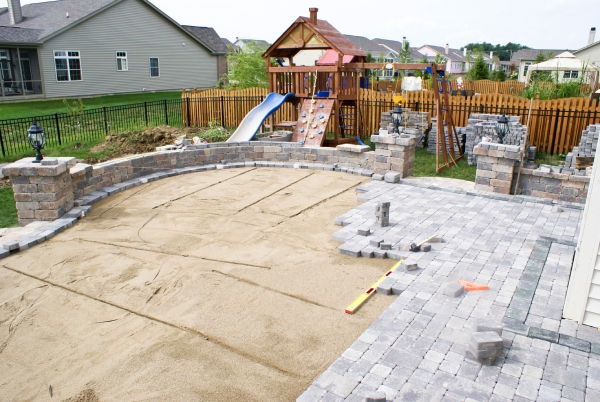
Paver Installation Permits: A Comprehensive Guide
Introduction
Pavers are a popular choice for outdoor surfaces due to their durability, versatility, and aesthetic appeal. However, installing pavers may require a permit depending on the location and scope of the project. This article provides a comprehensive guide to paver installation permits, including their purpose, requirements, application process, and potential costs.
Purpose of Paver Installation Permits
Paver installation permits serve several important purposes:
- Ensuring Compliance with Building Codes: Permits verify that the paver installation meets local building codes and standards, ensuring the safety and structural integrity of the project.
- Protecting Public Health and Safety: Permits help prevent potential hazards such as uneven surfaces, drainage issues, or erosion that could pose risks to pedestrians or vehicles.
- Maintaining Property Values: Properly permitted paver installations enhance the aesthetics of a property and contribute to its overall value.
- Preserving Environmental Integrity: Permits ensure that paver installations do not adversely impact stormwater runoff, groundwater recharge, or other environmental factors.
When a Paver Installation Permit is Required
The need for a paver installation permit typically depends on the following factors:
- Project Scope: Permits are generally required for large-scale paver installations, such as driveways, patios, or walkways that exceed a certain size or depth.
- Location: Local building codes and ordinances may vary regarding permit requirements. Some jurisdictions may require permits for all paver installations, while others may exempt small projects.
- Property Use: Commercial or public property may require permits for paver installations, even if residential properties do not.
How to Obtain a Paver Installation Permit
The application process for a paver installation permit typically involves the following steps:
- Contact the Local Building Department: Determine the specific requirements and application process for your jurisdiction.
- Gather Required Documents: Prepare a site plan, project description, and other relevant documents as specified by the building department.
- Submit the Application: Submit the completed application and supporting documents to the building department for review.
- Pay the Application Fee: Most jurisdictions charge a fee for processing permit applications.
- Await Approval: The building department will review the application and issue a permit if it meets all requirements.
Potential Costs of Paver Installation Permits
The cost of a paver installation permit can vary depending on the size and complexity of the project, as well as the jurisdiction. The following factors may influence the permit cost:
- Application Fee: The initial fee for submitting a permit application.
- Inspection Fees: Fees charged for inspections conducted by the building department to ensure compliance with permit requirements.
- Engineering Fees: If the project requires engineering plans or calculations, additional fees may apply.
- Contingency Fees: In some cases, the building department may require a contingency fee to cover unexpected costs or changes to the project.
Common Reasons for Permit Denials
Permit applications may be denied for various reasons, including:
- Incomplete or Inaccurate Information: Providing insufficient or incorrect information on the application can result in a denial.
- Non-Compliance with Building Codes: If the proposed paver installation does not meet local building codes, the permit may be denied.
- Environmental Concerns: Projects that pose potential environmental risks may be denied a permit.
- Property Line Issues: Paver installations that encroach on neighboring properties or violate property line setbacks may be denied.
Avoiding Permit Delays and Denials
To minimize the risk of permit delays or denials, consider the following tips:
- Plan Ahead: Allow ample time for the permit application and review process.
- Consult with Professionals: Seek guidance from a contractor or architect to ensure the project meets building codes and permit requirements.
- Be Accurate and Thorough: Provide complete and accurate information on the permit application.
- Address Concerns Early: If the building department raises any concerns, address them promptly to avoid delays.
- Consider Hiring a Permit Expediter: In some cases, hiring a permit expediter can help streamline the process and expedite permit approval.
Types of Paver Installation Permits
Depending on the scope and complexity of the project, different types of paver installation permits may be required:
- Building Permit: A general building permit is typically required for large-scale paver installations that involve structural changes or additions to the property.
- Grading Permit: This permit is necessary for projects that involve significant changes to the property’s elevation or drainage patterns.
- Landscaping Permit: Some jurisdictions may require a landscaping permit for paver installations in certain areas, such as front yards or public spaces.
- Homeowner’s Association Approval: In some cases, homeowners’ associations may have their own rules and regulations regarding paver installations, requiring additional approval.
Exemptions from Paver Installation Permits
In certain cases, paver installations may be exempt from permit requirements. These exemptions typically apply to:
- Small Projects: Small-scale paver installations, such as walkways or patios below a certain size, may not require a permit.
- Temporary Installations: Paver installations that are temporary or removable may not require a permit.
- Certain Jurisdictions: Some jurisdictions may have specific exemptions for paver installations in certain areas or for certain types of properties.
Penalties for Installing Pavers Without a Permit
Installing pavers without a permit can result in various penalties, including:
- Fines: Jurisdictions may impose fines for violating permit requirements.
- Stop Work Orders: The building department may issue a stop work order, requiring the project to be halted until a permit is obtained.
- Demolition: In extreme cases, unauthorized paver installations may be subject to demolition or removal.
Conclusion
Paver installation permits are essential for ensuring the safety, compliance, and aesthetic appeal of outdoor paver surfaces. By understanding the purpose, requirements, and application process for paver installation permits, property owners can avoid potential delays, denials, and penalties. By adhering to local building codes and obtaining the necessary permits, property owners can contribute to the overall integrity and value of their properties while enhancing their outdoor living spaces.